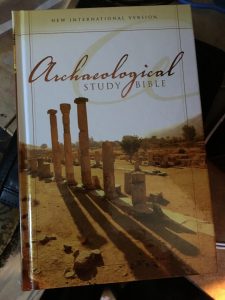My family does much of our shopping online. To assist with this, most of us have Amazon wish lists. A couple of years ago, my middle daughter, Jeanne, found this bible on my list and bought it for me. The concept is to add historical information about the locations, society, culture, and customs of the biblical stories. I had put it on the list as a whim, without any conscious plan. In the beginning, I was just randomly leafing through it or using it for reference.
However, this past Lenten season, I made a commitment to read the Easter story in each of the gospels and compare them to each other using a Lenten devotional book I had found. I chose the Archaeological Study Bible because I wanted to expand on the usual stories. When the forty days were up, I had become so immersed in the background information, I decided to extend the commitment and read all the way through all the gospels. To make it more manageable, I set a goal of one chapter a day. Unavoidably, there were days when I didn’t make that goal. However, I always picked it up again within a day or so and stayed with it. When I finished the gospels, it just seemed natural to read through The Acts.
Currently, I am on I Thessalonians, chapter 2. I’ve never really read the letters deeply. I’m not overly fond of a lot of Paul’s attitudes. However, I just can’t seem to stop and the background information does help me to better understand where he was coming from. I still find myself flinching at some of his statements, but he was a product of his times dealing with situations and attitudes that we are not exposed to ourselves. I am trying to develop more sympathy for him.
I am finding some disturbing parallels. One of the things that I love about study bibles is the explanations and historical background they give at the beginning of each book. In the introduction to I Thessalonians, I have underlined this: “Watch for practical advice on living the Christian life within the context of an immoral culture that is hostile to Christian values.” I tell myself we aren’t there yet, but I fear we are getting closer all the time.
Between those who insist every word of the bible is fact, spouting hateful attitudes and slogans, twisting Christianity to fit their own agenda; and the rising atheistic culture that treats God and the bible as mythical, I feel surrounded by threats.
I started my theological quest several years ago so that I could gain the expertise to counter both sides. I believe that the whole bible is God inspired but, not all fact. Much of it is allegory or metaphor, examples of how things could have happened. Some of it is outmoded: We do not stone people anymore for relatively minor infractions nor cast them out of society due to skin infections. It was written in the terms people, at the time, could understand; but it is still true.
The people living in bible times did not have the knowledge necessary to accept scientific explanations so the story was told in a way that they would be able to accept. I do believe, if we dig deep enough, we can translate it into modern terminology that makes sense. That is what I am trying to do. My “Archaeological Study Bible” is showing me a path to that end.
Once I finish the New Testament, I plan to start with Genesis and work through the Old Testament in the same way. Other than the basic stories we are all taught, I’ve never had much patience for that part of the bible. There seems to be too much anger and violence to fit with the loving Father that we are shown through Jesus’ words.
Many of the notes embedded in the gospel text discuss how much of Jesus’ teaching referenced Old Testament writings. I’ve never given them more than passing thought. My goal is to connect the two in a meaningful way. From time to time, I intend to post my thoughts here. I hope you will find them helpful in your own quest to a deeper spiritual relationship with God.
Please follow and like us:
 I finished the New Testament a month or two ago. Well, I stopped. I’ve always had trouble with Revelations and The Archaeological Study Bible didn’t solve that problem. I tried several times and just couldn’t plow through it, so I moved on the Genesis and found I was getting more out of the various inserts than the actual text.
I finished the New Testament a month or two ago. Well, I stopped. I’ve always had trouble with Revelations and The Archaeological Study Bible didn’t solve that problem. I tried several times and just couldn’t plow through it, so I moved on the Genesis and found I was getting more out of the various inserts than the actual text.